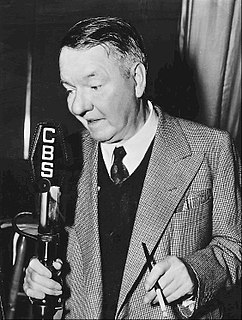A Quote by W. C. Fields
No one likes the fellow who is all rogue, but we'll forgive him almost anything if there is warmth of human sympathy underneath his rogueries. The immortal types of comedy are just such men.
Related Quotes
The perception of the comic is a tie of sympathy with other men, a pledge of sanity, and a protection from those perverse tendencies and gloomy insanities in which fine intellects sometimes lose themselves. A rogue alive to the ludicrous is still convertible. If that sense is lost, his fellow-men can do little for him.
The ideal audience the poet imagines consists of the beautiful who go to bed with him, the powerful who invite him to dinner and tell him secrets of state, and his fellow-poets. The actual audience he gets consists of myopic schoolteachers, pimply young men who eat in cafeterias, and his fellow-poets. This means, in fact, he writes for his fellow-poets.
It is a fearful thing to hate whom God hath loved. To look upon another-his weaknesses, his sins, his faults, his defects is to look upon one who is suffering. He is suffering from negative passions, from the same sinful human corruption from which you yourself suffer. This is very important: do not look upon him with judgmental eyes of comparison, noting the sins you assume you'd never commit. Rather, see him as a fellow sufferer, a fellow human being who is in need of the very healing of which you are in need. Help him, love him, pray for him do unto him as you would have him do unto you.
I know he did horrible things in the jungle. Things no amount of alcohol or pills could erase. War stains soldiers, all the way through their psyches, into their souls. I understand that, and could almost forgive him for taking his own life, to quiet the ghosts. But I can never forgive him for taking my mother with him.
It is by sympathy we enter into the concerns of others, that we are moved as they are moved, and are never suffered to be indifferent spectators of almost anything which men can do or suffer. For sympathy may be considered as a sort of substitution, by which we are put into the place of another man, and affected in many respects as he is affected.
"If a man finds it very hard to forgive injuries, let him look at a Crucifix, and think that Christ shed all His Blood for him, and not only forgave His enemies, but even prayed His Heavenly Father to forgive them also. Let him remember that when he says the Pater Noster, every day, instead of asking pardon for his sins, he is calling down vengeance on himself."
No, I can't admit it. Brother,' said Alyosha suddenly, with flashing eyes, 'you said just now, is there a being in the whole world who would have the right to forgive and could firgive? But there is a Being and He can forgive everything, all and for all, because He gave His innocent blood for all and everything. You have forgotten Him, and on Him is built the edifice, and it is to Him they cry aloud, "Thou art just, O Lord, for Thy ways are revealed!


































